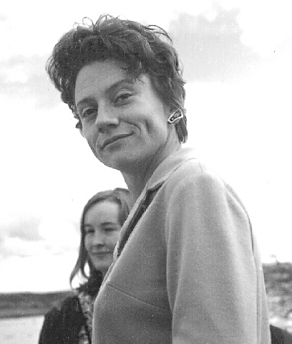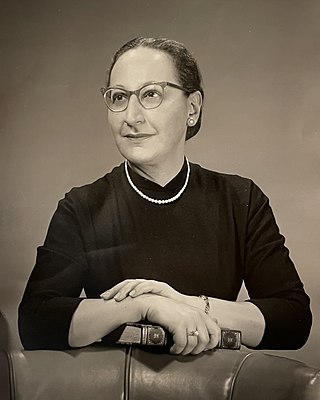Related Research Articles
Robert Hinrichs Bates is an American political scientist specializing in comparative politics. He is Eaton Professor of the Science of Government in the Departments of Government and African and African American Studies at Harvard University. From 2000–2012, he served as Professeur associé, School of Economics, University of Toulouse.

Jane Ellen Buikstra is an American anthropologist and bioarchaeologist. Her 1977 article on the biological dimensions of archaeology coined and defined the field of bioarchaeology in the US as the application of biological anthropological methods to the study of archaeological problems. Throughout her career, she has authored over 20 books and 150 articles. Buikstra's current research focuses on an analysis of the Phaleron cemetery near Athens, Greece.
Michelle "Shelly" Zimbalist Rosaldo was a social, linguistic, and psychological anthropologist famous for her studies of the Ilongot people in the Philippines and for her pioneering role in women's studies and the anthropology of gender.
Linda L. Barnes is an American medical anthropologist, a professor of family medicine at Boston University School of Medicine, and in the Graduate Division of Religious Studies at Boston University. Her research specialties are the social and cultural history of Western responses to Chinese healing traditions, and the interdisciplinary study of cultural, religious, and therapeutic pluralism in the United States. She has been regularly cited as an authority in the use of religiously based therapeutic traditions.
Harold K. "Hal" Schneider was an American seminal figure in economic anthropology. Born in Aberdeen, South Dakota, he attended elementary and secondary school in St. Paul, Minnesota, and did his undergraduate work at Macalester College and Seabury-Western Theological Seminary, receiving a bachelor's degree in sociology, with a minor in biology, from Macalester in 1949. He then went to Northwestern University, where he was a student of Melville Herskovits, basing his dissertation on field research among the Pokot of Kenya.
Janet Roitman is an American anthropologist. She is the co-founder of the Platform Economies Research Network. Roitman is a professor at RMIT University, an Associate Investigator with the Centre of Excellence for Automated Decision-Making and Society (ADM+S), and co-Director of the Digital Ethnography Research Centre. She is also a member of the Council of Advisors for the Platform Cooperativism Consortium, New York.

Cynthia Irwin-Williams was an archaeologist of the prehistoric American Southwest. She received a B.A. in Anthropology from Radcliffe College in 1957; the next year she received a M.A. in the same field. In 1963 she completed her educational career in Anthropology with a PhD. from Harvard University. Beginning her career in the 1950s, Irwin-Williams was considered a groundbreaker for women in archaeology, like her friend and supporter Hannah Marie Wormington.
Virginia Dominguez is a political and legal anthropologist. She is currently the Edward William and Jane Marr Gutgsell Professor of Anthropology at the University of Illinois at Urbana-Champaign.

Sarah Francesca Green is currently a professor of social and cultural anthropology at the University of Helsinki. She is a specialist on borders, spatial relations, gender and sexuality, and information and communications technologies. She has lived in Greece, the UK, US, Italy and currently lives in Helsinki, Finland. In September 2016, Green was awarded a European Research Council (ERC) Advanced Grant to develop new research in the Mediterranean region. The project is called Crosslocations. She was also awarded an Academy of Finland Project, called Transit, Trade and Travel, which also concerns the Mediterranean, though its focus is different.
Lenore Hilda Manderson is an Australian medical anthropologist. She is Professor of Medical Anthropology in the Faculty of Medicine, Nursing and Health Sciences, and the School of Political and Social Inquiry, Faculty of Arts, at Monash University, Australia.
Sara Sweezy Berry is an American scholar of contemporary African political economies, professor of history at Johns Hopkins University and co-founder of the Center for Africana Studies at Johns Hopkins.
Dame Karin Judith Barber, is a British cultural anthropologist and academic, who specialises in the Yoruba-speaking area of Nigeria. From 1999 to 2017, she was Professor of African Cultural Anthropology at the University of Birmingham. Before joining the Centre of West African Studies of the University of Birmingham, she was a lecturer at the University of Ife in Nigeria. Since 2018, she has been Centennial Professor of Anthropology at the London School of Economics.

Melissa Leach, is a British geographer and social anthropologist. She studies sustainability and development concerns in policy-making and has a focus on the politics of science and technology of Africa. As of 2017 she was the Director of the Institute of Development Studies (IDS) located on the University of Sussex campus.
Shirley G. Ardener is a pioneer of research on women and a committed anthropological researcher working with Bakweri people in Cameroon since the 1950s, initially with her husband Edwin Ardener (1927–1987).
Adia Benton is an American cultural and medical anthropologist whose research concerns how care is provided in humanitarian emergencies and development projects. Benton is currently an associate professor of anthropology and African Studies at Northwestern University.
Larissa Adler Lomnitz was a French-born Chilean-Mexican social anthropologist, researcher, professor, and academic. After living in France, Colombia, and Israel, she received Chilean nationality by marriage and Mexican nationality by residence. She conducted research and studies regarding the way in which marginalized classes survive in Latin America. She pioneered the study of social networks and the study of the importance of trust for the economy and politics. Her first study in this regard focused on the exchange of favors in the Chilean middle class. Lomnitz completed her doctoral thesis about the importance of exchanging favors and confidence in the informal economy in Mexico City. She then explored the importance of social networks in very diverse fields: scientific communities, the Mexican upper class, and the teaching profession in Chile, among others. She wrote more than 70 chapters in books, nine books, and various popular articles for magazines.

Ethel M. Albert was an American ethnologist. Albert conducted ethnological research related to speech, values, and ethics, employing a cross-cultural approach studying different social classes, ethnic groups, and locations. Albert conducted research with the Navajo (Diné) in the American southwest and the Rundi people in the Republic of Burundi. Albert is most well known among late twentieth-century American semiotics researchers for reviving semiotics in the American university curriculum.
Deborah James, is a South African anthropologist and academic, who specialises in South Africa, economic anthropology, political anthropology, and ethnography.

Carola Lentz is a German social anthropologist and, since November 2020, president of the Goethe-Institut. She is senior research professor at the Department of Anthropology and African Studies at Johannes Gutenberg University, Mainz.
References
- 1 2 Reed, Ann M. (8 May 1998). "Jane I. Guyer: The Contributions of a Scholar". Indiana University. Retrieved 28 June 2012.
- ↑ Exhibit guide Archived 2014-02-05 at the Wayback Machine